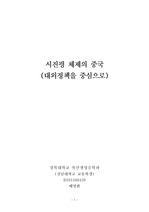

PARTNER
검증된 파트너 제휴사 자료
유럽연합의 확대와 개혁 그리고 법치국가성 (Enlargement of the European Union and the Conditionality of the Rule of Law Regulation)
34 페이지
최초등록일 2025.03.19
최종저작일
2025.01

-
서지정보
· 발행기관 : 경북대학교 법학연구원
· 수록지 정보 : 법학논고 / 88호 / 1 ~ 34페이지
· 저자명 : 박진완
초록
유럽연합은 조건적 합의의 이행을 전제로 한 요구의 수용을 내용으로 하는 조건성의 원칙(Prinzip der Konditionalität)을 유럽연합의 외교정책적 요소에서 유럽연합의 거버넌스의 도구로 발전시켰다. 초기에 국제금융기관들이 자신들의 신용약정의 안전장치로서 발전시겼던 조건성의 원칙을 유럽연합은 거버넌스 유지를 위하여 다양한 형식과 적용방식을 통해서 실행하였다. 유럽연합은 처음에는 이 원칙을 처음에는 주로 대외 무역관계와 발전정책적 프로그램을 조정하고 관리하는 도구로 사용하였지만, 그 후 시간이 흘러감에 따라 유럽연합은 이 원칙을 유럽연합의 대외적인 확대정책의 확정적 요소로 발전시켰다.
유럽연합 속에서 조건성 메커니즘(conditionality mechanism)의 적용은 유럽연합의 확대정책, 유럽경제통합연합(European Economic and Monetary Union, EMU)의 유지 그리고 유럽연합의 결합과 응집력 확보를 위한 다양한 유럽연합의 외부적 그리고 내부적 정책수립과 그 실행과정에 적용되었다. 유럽연합의 확장조건(enlargement conditionality)은 유럽연합을 통한 가장 성공적인 조건성 메커니즘의 적용으로 인정된다어떤 국가의 유럽연합 가입과정에서의 조건성의 원칙의 적용을 통해서 유럽연합은 자신의 확대정책을 통해서 새로운 가입국가들에 대해서 자신의 정치적, 경제적 그리고 사회적 개혁적 요구들을 수용하고, 이에 순응하게 만든다. 이러한 새로운 가입국의 유럽연합이 제시하는 정치적・경제적 수준들의 충족을 전제로 한 유럽연합의 새로운 가입국에 대한 확대정책의 실행은 유럽연합이 유럽전체의 평화, 민주주의 그리고 경제적 성장의 보장을 위한 노력을 실행하는 과정으로 해석될 수 있다.
어떤 국가가 유럽연합에 가입하기 위해서 반드시 충족해야만 하는 코펜하겐 기준(Copenhagen criteria)으로 알려진 가입기준(accession criteria)은 1993년 코펜하겐의 유럽이사회(Copenhagen European Council)에 의하여 확정되고, 1995년 마드리드 유럽이사회(Madrid European Council)에 의하여 강화된 것이다. 어떤 국가가 유럽연합에 가입할 자격이 있는지 여부를 판단하는 가입기준이 되는 코펜하겐 기준은 그 국가가 민주주의와 인권의 보장과 같은 정치적 기준, 시장경제가 제대로 작동하고 있는지 여부에 관한 경제적 기준 그리고 유럽연합의 회원국의 의무이행과 유럽연합의 법을 존중하고 실행하는지 여부에 관한 법적인 기준으로 구성된다.
유럽연합의 확대로 인하여 다양한 가입국가들 사이의 경제적, 문화적, 사회적, 정치적 측면에서의 이질성이 점점 더 증가됨에도 불구하고, 유럽연합의 확대를 지지하는 입장은 유럽연합체제의 제도적 개혁을 통하여 확대된 유럽연합이 직면하게될 여러 가지 도전적인 문제상황에서의 유럽연합의 위기대처능력을 강화시킬 필요가 있다는 주장을 제기한다폴란드와 헝가리 같은 유럽연합이 유럽연합조약 제2조에 규정된 법의 지배(rule of law) 원리를 위반한 가입국에서 법의 지배 조건성 규제(rule of law conditionality regulation)는 유럽연합 집행위원회가 유럽연합 조약 제2조에 명시된 법의 지배의 원리를 위반하는 회원국가에 대해 유럽연합 예산으로부터 나오는 자금 지급을 중단하는 등의 조치를 취하게 만든다, 이러한 유럽연합의 법의 지배 조건성 규제의 발동여부에 대한 논의점들 역시 유럽연합의 보편적 가치인 법의 지배 원리의 중유럽 혹은 동유럽 국가에로의 확장과 관련된 유럽연합 체제의 도전과 이에 대한 적응능력의 확보와 관련된 것으로 볼 수 있다.영어초록
The European Union developed the principle of conditionality, which requires acceptance of demands on the premise of the implementation of conditional agreements, from an element of the European Union's foreign policy to an instrument of the European Union's governance. The principle of conditionality, which was initially developed by international financial institutions as a safety device for their credit commitments, was implemented by the European Union in various forms and application methods in order to maintain governance. The European Union initially used this principle mainly as a tool to coordinate and manage foreign trade relations and development policy programs, but over time, the European Union developed this principle into a definitive element of the European Union's external expansion policy.
Within the European Union, the application of the conditionality mechanism has been applied to the EU's enlargement policy, the maintenance of the European Economic and Monetary Union (EMU), and the formulation and implementation of various EU external and internal policies to secure the EU's unity and cohesion. The EU's enlargement conditionality is recognized as the most successful application of the conditionality mechanism through the EU.
By applying the principle of conditionality in the process of accession of a state to the European Union, the European Union, through its enlargement policy, makes new member states accept and comply with its political, economic and social reform demands. The implementation of the European Union's enlargement policy toward new member states, which presupposes that the new member states meet the political and economic standards presented by the European Union, can be interpreted as a process in which the European Union makes efforts to ensure peace, democracy and economic growth throughout Europe.
The accession criteria, known as the Copenhagen criteria, which a state must meet in order to join the European Union were established by the Copenhagen European Council in 1993 and strengthened by the Madrid European Council in 1995. The Copenhagen criteria, which determine whether a state is qualified to join the European Union, are made up of political criteria such as whether the state guarantees democracy and human rights, economic criteria such as whether the market economy is functioning properly, and legal criteria such as whether the state fulfills the obligations of a member state of the European Union and respects and enforces the law of the European Union.
Despite the increasing heterogeneity in economic, cultural, social, and political aspects among the various member states due to the enlargement of the EU, the position supporting the enlargement of the EU argues that the EU's crisis response capacity in the various challenging problem situations that the enlarged EU will face needs to be strengthened through institutional reform of the EU system.
In member states such as Poland and Hungary, where the EU violates the rule of law principle stipulated in Article 2 of the Treaty on the European Union, the rule of law conditionality regulation allows the European Commission to take measures such as suspending the payment of funds from the EU budget to the member state that violates the rule of law principle stipulated in Article 2 of the Treaty on the European Union. The discussion on whether the EU's rule of law conditionality regulation will be activated can also be seen as related to the challenge of the EU system related to the expansion of the universal value of the rule of law to Central or Eastern European countries and securing the ability to adapt to it.참고자료
· 없음태그
-
자주묻는질문의 답변을 확인해 주세요

꼭 알아주세요
-
자료의 정보 및 내용의 진실성에 대하여 해피캠퍼스는 보증하지 않으며, 해당 정보 및 게시물 저작권과 기타 법적 책임은 자료 등록자에게 있습니다.
자료 및 게시물 내용의 불법적 이용, 무단 전재∙배포는 금지되어 있습니다.
저작권침해, 명예훼손 등 분쟁 요소 발견 시 고객센터의 저작권침해 신고센터를 이용해 주시기 바랍니다. -
해피캠퍼스는 구매자와 판매자 모두가 만족하는 서비스가 되도록 노력하고 있으며, 아래의 4가지 자료환불 조건을 꼭 확인해주시기 바랍니다.
파일오류 중복자료 저작권 없음 설명과 실제 내용 불일치 파일의 다운로드가 제대로 되지 않거나 파일형식에 맞는 프로그램으로 정상 작동하지 않는 경우 다른 자료와 70% 이상 내용이 일치하는 경우 (중복임을 확인할 수 있는 근거 필요함) 인터넷의 다른 사이트, 연구기관, 학교, 서적 등의 자료를 도용한 경우 자료의 설명과 실제 자료의 내용이 일치하지 않는 경우
찾으시던 자료가 아닌가요?
지금 보는 자료와 연관되어 있어요!
문서 초안을 생성해주는 EasyAI



